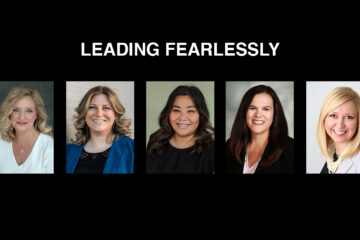Commentary: How open-minded leadership advances women in the workplace
By Holly Stevenson, director of diversity, equity, inclusion and belonging, Optimae LifeServices

Today’s world is a polarized place. We cannot escape discussion of “sides.” Whether it be political party allegiance or women’s college basketball, we live in an era of seeing those who think differently from us as “other” and “wrong.” We are taught to be strong-minded and steadfast in our convictions; we often hear mantras such as “Stay true to yourself!” and “Never change who you are!”
While it is important to be committed to our values and beliefs, open-mindedness is a crucial skill both in daily life and in leadership. From a workplace perspective, cultivating our aptitude to be open-minded helps to advance underrepresented groups in the workplace — including women — enabling us all to thrive.
Here are three key skills of the open-minded leader.
Thirst for learning
The most honest sentence is “I don’t know.” There is no shame in not knowing something. True knowledge — and leadership — stems from the realization that we don’t know what we don’t know. We should always be open to broadening our understanding on issues.
Further, since each individual navigates the world differently, given the identities they hold and the unique ways in which they intersect, it is impossible for one person to know everything. To claim as such only denies the experiences of those who do not have the luxury of being routinely listened to or asked for their views.
Learning can be exhausting. Debating viewpoints can feel like a personal attack. And we might worry that we will appear inept or weak when we ask for advice or admit that we don’t know it all. This is particularly true if we are in a leadership role and have others looking to us for answers. However, an open-minded leader’s thirst for learning overcomes the hurdle of feeling inadequate as they know that the real inadequacy is to fail to provide everyone with a voice and to shut down learning opportunities.
Although it can be frustrating when a child incessantly asks “why?” — this natural curiosity is a character trait that open-minded leaders retain and use to propel their desire to learn from others. Of course, they do not tokenize when asking for others to share and to teach. That is to say, they do not include diverse voices and minds to keep up appearances or check boxes. Instead, inclusion of all occurs organically in workplaces where open-mindedness is the norm.
When those in the workplace are more concerned with learning than they are with their ego, marginalized employees will feel they have the permission to actively participate. Additionally, research has shown that contributions of women are often overlooked or wrongly attributed to men. When women believe that they work within a culture of growth where learning is valued, they will be more inclined to speak up, have their work appreciated and feel confident in applying for promotions, wrote Jessica Nordell in her book “The End of Bias: A Beginning: The Science and Practice of Overcoming Unconscious Bias.”
Acceptance of others
Brené Brown once said, “All of us fight hidden, silent battles.”
It is important to treat everyone with the same grace we would hope to be extended toward us. When we begin to truly accept others, even those who dramatically disagree with us, we not only work on our open-mindedness and receptiveness to new ideas, but we also practice empathy and tolerance — two other critical character traits for effective leadership. Instead of calling out those who they disagree with or othering people due to their differences, open-minded leaders call in everyone to have productive dialogue where all parties learn and grow.
Accepting everyone as they are does not mean that we are all perfect. Instead, it focuses on respect and celebration of everyone despite our faults and fallibility, allowing us to make mistakes and share our true selves. It is only when we feel we do not need to cover aspects of our identity in the workplace that we can work toward equitable conditions. For example, according to Deloitte, women cite a lack of flexible working hours as the No. 1 reason for wanting to leave a job. When we accept the whole individual and respect that nobody is solely an employee, we can have crucial conversations about workplace equity that result in women staying and advancing in their careers.
Awareness of own limitations
Oprah Winfrey once said, “True humility is staying teachable, regardless of how much you already know.”
Humility is severely underrated. Being able to recognize the importance of different perspectives comes hand in hand with the acknowledgement that everyone has biases we must always be trying to address. For example, halo bias makes us think favorably of people we like and can derail us into discounting the potential of those we know less well in the workplace. Recency bias also makes us unknowingly susceptible to focusing more on the accomplishments or contributions of those we spend more time with.
Occasionally stopping ourselves in our tracks to ask ourselves, “Am I potentially being biased here?” can be a helpful tool to ensure that, to the best of our abilities, everyone is receiving a fair chance to succeed in the workplace.
Helpful resources :
- “Are You Open Minded? Three Ways to Break Thinking Patterns” by Paul Sloane, TEDx, University of Brighton: Watch the video.
- “What is the true definition of being open-minded?” by Maryam Fuad Bukhash, TEDx, Zayed University: Watch the video.
- “Four Benefits of Being an Open-Minded Leader” LinkedIn: Read the post.


